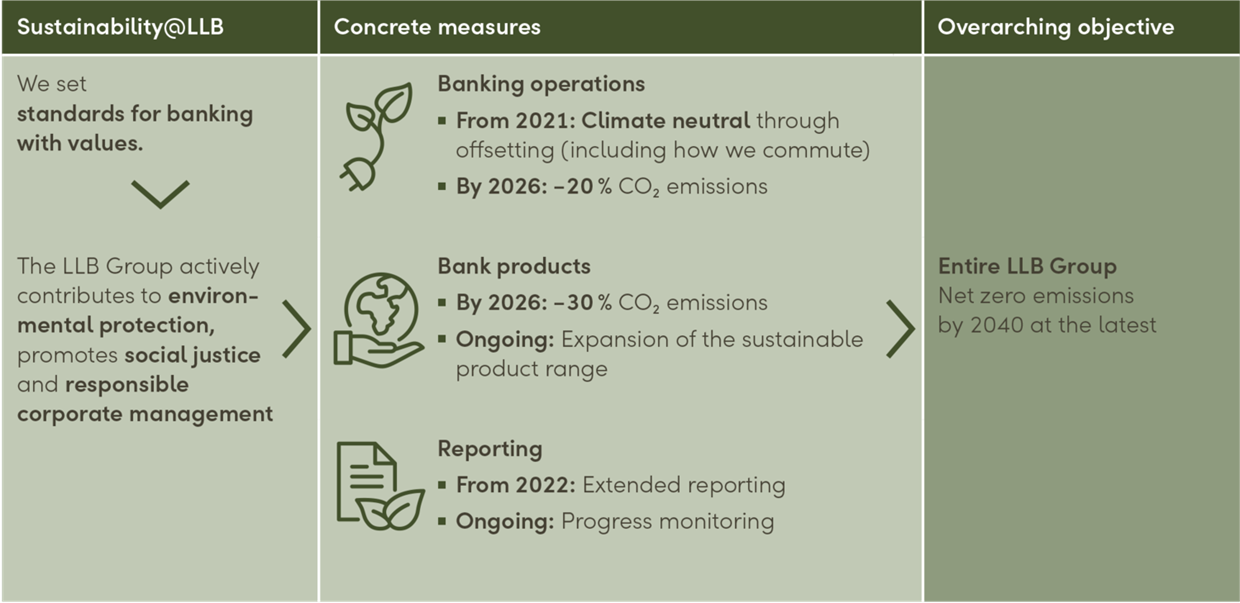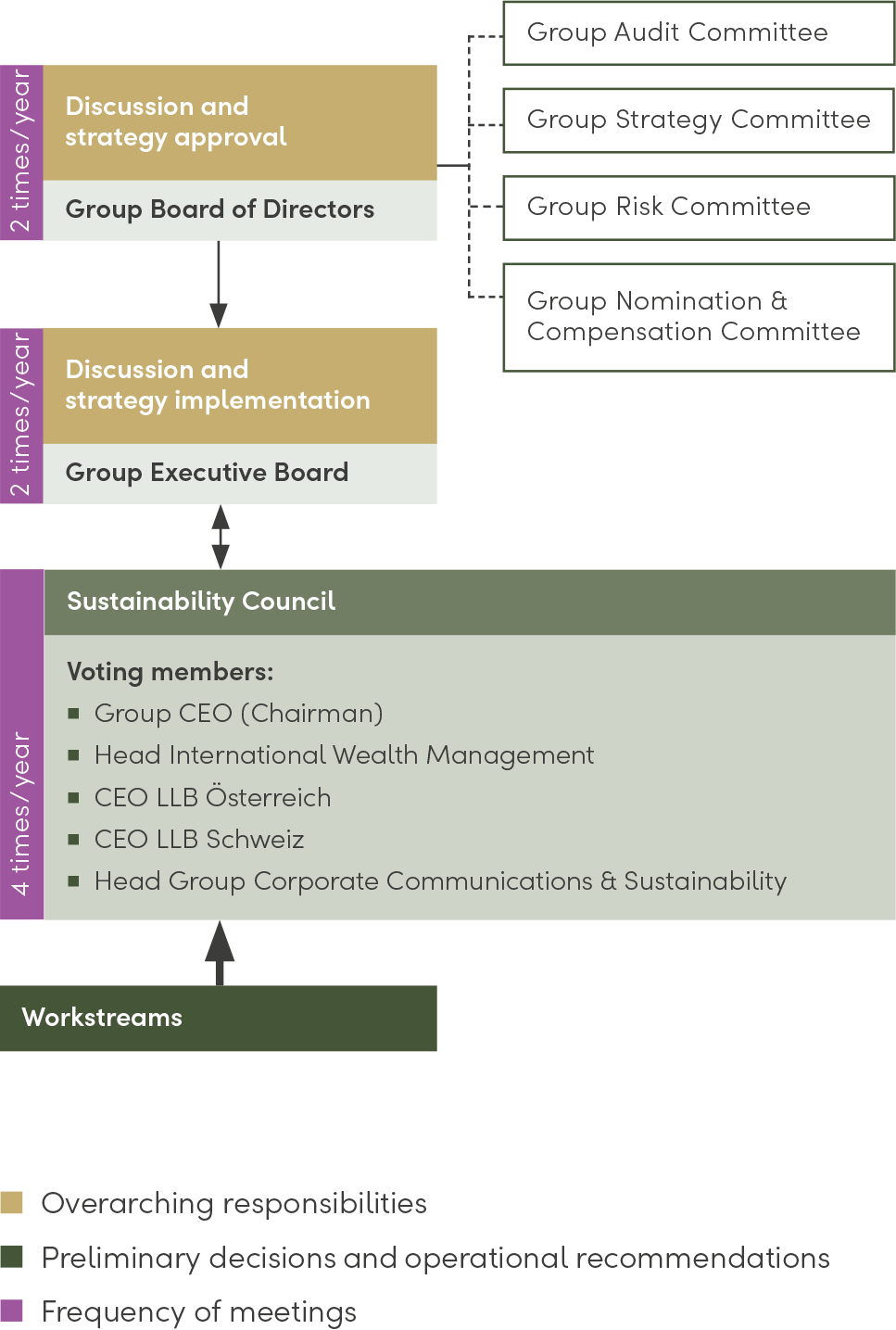Our understanding of sustainability
Information unaudited Information ungeprüft Our understanding of sustainability
As a financial institution with a long-term orientation, the LLB Group is committed to leaving an environment that is as intact as possible and stable social conditions for the coming generations. With our ACT-26 corporate strategy and ambitious climate and sustainability targets, we continue to proceed resolutely down this path.
Performance mandate and sustainability
As Liechtenstein’s longest-established bank, we are aware of our special responsibility for long-term action. Sustainable business management is part of our performance mandate and corporate identity. We have a legal obligation to our majority shareholder, the Principality of Liechtenstein, to promote Liechtenstein’s economic development while at the same time taking ethical as well as environmental factors into account. We fulfil this special obligation by offering a diverse portfolio of products and services, applying sustainable standards to our offerings, our infrastructure and procurement, and engaging broadly in society.
Sustainability as a strategic goal
Sustainability is one of the three core elements of our corporate strategy ACT-26 (see chapter Strategy and organisation). We want to continue to play a central role in this area. Above all, we want to make a positive contribution to the climate – including by reducing our greenhouse gas emissions in banking operations and in our products. Our aim with ACT-26 is to be perceived as a bank that is stable, sustainable and innovative. We also want to differentiate ourselves from our competitors through it.
Overview of our climate strategy

Goals of the sustainability strategy
We have undertaken to reduce CO2 emissions for the LLB Group to net zero by 2040 – so ten years earlier than agreed under the Paris Climate Agreement. This requirement applies to both our banking operations and our products and services. There are intermediate steps involved in achieving this reduction: by 2026, we should be saving at least 30 per cent of CO2 emissions from products and own investments, and at least 20 per cent in our banking operations.
We have set 2019 as the base year for all reduction measures. In other words, we will measure our progress by the values we achieved in 2019, as this was the last full year before the COVID-19 pandemic. Because of the regulations at the time, using the data for 2020 and 2021 would provide a strongly distorted picture.
Our Board of Directors has adopted a sustainability strategy. Implementation happens at Group Executive Board level (see chapter Sustainability governance of the LLB Group).
Climate-friendly banking operations
As a first step, our banking operations became climate-neutral in the 2021 business year by fully offsetting our greenhouse gas emissions. In co-operation with the Swiss climate foundation “myclimate”, we support various CO2-reducing projects in the region and around the world. Among these is a reforestation initiative in western Uganda and a project for fertile soil as a CO2 sink in the Lake Constance region. This is done through CO2 removal certificates. These projects remove greenhouse gases from the atmosphere. According to the Intergovernmental Panel on Climate Change, only removal certificates can be used to offset in order to achieve net zero emissions.
So far, we have seen a decline in operational emissions of around 23 per cent compared to the base year 2019. We want to further reduce the proportion of offsets in favour of savings, including striving to achieve the net-zero target in banking operations by 2040 (see chapter Corporate environmental and climate protection).
Banking products and services
In addition to adapting our day-to-day operations, we also want to support our clients on the way to climate neutrality: with expert advisory services and differentiated, sustainable products. Specifically, we have set itself here, too, the goal of reducing the CO2 emissions of all our bank products to net zero by 2040. This would mean the LLB Group becoming completely climate neutral across our banking operations and products ten years earlier than defined in the Paris climate agreement.
Adapting our offerings is a key factor in achieving the targets that we have set for ourselves. As a result, we have greatly expanded our range of responsible and sustainable investment products. In addition to our established asset management and investment advisory services, we also offer a complete selection of funds that invest according to appropriate criteria. The two “dark green” LLB Impact Climate funds launched in 2022, which are characterised by a comprehensibly positive impact on the environment and nature, have already achieved an investment volume of almost CHF 800 million. At the same time, we promote sustainable construction in our core markets with special financing solutions (see chapter Environmental and social responsibility in banking).
Governance
Sustainability encompasses not only the environmental but also the social and governance aspects. We are committed to value-based leadership and transparent corporate governance. We live up to our responsibility through effective compliance, risk and reputation management. Compliance with laws and regulations is a matter of course for us. We have set out our ethical standards for ourselves and our suppliers in two codes of conduct (see chapter Values and corporate management).
Human rights and international standards
Respect for international human rights underpins our actions. We are committed to the key human rights conventions, in particular the United Nations Human Rights Charter and the declarations and basic principles of the International Labour Organization (ILO). We take human rights into account not only in our business operations, but also in our investments (see chapter Environmental and social responsibility in banking).
Diversity and inclusion
The topic of diversity and inclusion is of particular importance. As part of our diversity strategy, we have formulated clear targets with regard to the mix of gender and people we employ in the LLB Group. For example, we want to significantly increase the proportion of women in positions of responsibility by 2026. We want younger employees to be able to advance to management positions earlier, and keep older employees in the company for as long as possible (see chapter Employees).

Further development of staff competences
Our employees are an important factor for the success of our sustainability strategy. We offer staff appropriate training or professional education so as to stay up to date with changing regulatory requirements as well as with our growing number of sustainable products (see chapter Employees).
Support for charitable projects
With the LLB Future Foundation, founded in 2011, we are committed to social and ecological sustainability in the region. We are particularly interested in supporting social projects that improve people’s living and working conditions and foster self-responsibility. In terms of the environment, our commitment to environmental sustainability is of particular importance. In addition to project-related contributions of CHF 71ʼ000, the Future Foundation contributed to society in 2023 by donating a total of CHF 153ʼ000 to 28 social organisations (see chapter Industry initiatives and corporate citizenship).
Transparency
We have used the Global Reporting Initiative (GRI) Standards as the framework for our sustainability reporting for many years. Since 2022, we have also been publishing annual reports on our further development in terms of climate protection. These reports feature an honest overview of the range of measures we have adopted to implement the climate objectives – in accordance with the internationally recognised standards of the Task Force on Climate-related Financial Disclosures (TCFD). They also show where we stand on the path to climate neutrality.
Sustainability governance of the LLB Group
In order to enable the efficient implementation of its sustainability strategy, the LLB Group set up a new governance structure in the 2022 business year. This ensures that sustainability concerns are addressed at every hierarchical level. In charge of coordinating our ambitious goals is the Sustainability Council. This is a key governing body in our governance structure and has five permanent members. The Group CEO acts as Chair. The four other members are the CEOs of the subsidiaries LLB Österreich and LLB Schweiz as well as the Head of International Wealth Management and the Head of Group Corporate Communications & Sustainability.
The Sustainability Council is tasked with overseeing the implementation of the sustainability strategy and making adjustments where necessary. The council generally convenes every three months. It informs the Group Executive Board about how climate risk management is progressing on a semi-annual basis. The Group Executive Board reports to the Board of Directors on the implementation and progress of the sustainability strategy twice a year.
In December 2023, the Group Executive Board decided to extend the Sustainability Council. From 2024, the Group CFO, the Group CDO and the Head of Private and Corporate Clients will also be voting members of the Board.
Streams and Green Teams
The operational implementation of the sustainability and climate strategy is the responsibility of eleven workstreams. Each workstream has either a product focus (e.g. credits) or a thematic focus (e.g. social impact) and reports to the Sustainability Council every three months.
In addition, our “Green Teams” have been in place since 2021. In these teams, employees can contribute their own ideas and take on project responsibility during regular working hours, thereby helping to actively shape the sustainable future of the LLB Group. We want in this way to tap into the creativity of each individual in order to find innovative solutions that would not be found otherwise through a top-down only approach.
Overview of sustainability and climate governance structure (as at 31 December 2023)

Board of Directors
As the highest governing body at the LLB Group, the Board of Directors regularly participates in related discussions and approves the sustainability and climate strategy as well as the sustainability report as part of the annual report. At a closed meeting held in June 2023, it was updated on the implementation status of the various strategic initiatives, with a particular focus on LLB’s lending business. At its meetings, the Board of Directors is also kept informed about progress in the area of sustainability.
- The Group Risk Committee informs the Board of Directors specifically about the risks of climate change.
- The Group Nomination & Compensation Committee incorporates sustainability into the incentive systems.
- The Strategy Committee advises on adjustments to the existing sustainability strategy.
- The Group Audit Committee reviews and approves the sustainability report.
In the reporting year, no measures were taken to improve the sustainability-related knowledge of the members of the Board of Directors. A training course on sustainability regulations is planned for 2024.
In addition to the bodies that have already been mentioned, which maintain a broad strategic and operational focus on sustainability issues including climate-related opportunities and risks, climate risks are currently integrated into the existing risk management structure, where they are closely managed.